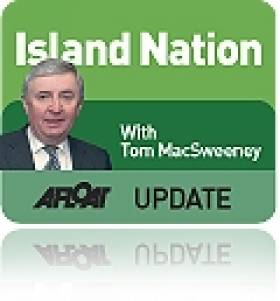Displaying items by tag: Valerie Cummins
How Many Times Do I Have to Say the Sea is Vital to Ireland?
Ireland has the largest maritime area-to-land mass in the European Union, but derives only 1% of GDP from the maritime sector. At a time when the economy needs every benefit it can get this figure is startling, particularly when compared to countries with other extensive coastlines, such as Norway where the figure is 20%, Denmark where it is 11% and even the UK which has increased its figure to 5%.
Despite being an island nation with a strong dependency on the sea, the Irish maritime economy is still in its infancy, both in terms of investment and of recognition.
Once again the importance of the sea was shown in the pre-Christmas weather problems. When air transport again failed the public, the ferries continued to operate. When road transport needed salt for gritting to keep roads open, it was ships which brought the salt to Ireland.
How many times do I have to challenge the ignorance and stupidity of the State, of Government, towards the sea? How many times do I have to remind the public of how dependent we are on the sea as an island nation?
Though still considered a low priority by Government, the maritime sector is worth €3 billion to the nation and supports 440,000 direct and indirect jobs. According to the Marine Institute in the "SeaChange Programme," this could be increased by at least 50%.
In Cork the Coastal and Marine Resources Centre which is part of UCC's Environmental Research Institute and has been working out of the Naval Base on Haulbowline Island has changed its name and is planning to move to a new maritime research facility. It has become the "Coastal and Marine Research Centre".
For over ten years the CMRC has been promoting the use of integrated coastal zone management as a means of achieving sustainable development in the use of coastal and marine resources, including marine ecology, seabed mapping, coastal processes, remote sensing, geology and geomatics.
A new maritime research facility is planned at Ringaskiddy, adjacent to the National Maritime College, part of the announced intention to establish a Maritime and Energy Research Campus and Commercial Cluster. The Department of Communications, Energy and Natural Resources, Bord Gais and the UCC Glucksman Foundation contributed funding, together with €7.5m. from the Higher Education Authority. As part of the National Ocean Energy Strategy, it will "bring together on one site the people, their ideas and the infrastructure to support the development of ocean energy," according to MERC Chairman, Peter Coyle. "Our aim is to produce innovative technical solutions to support the development of the Irish maritime sector."
This will include ocean energy opportunities, such as wave power where Irish companies have been leading the way. Shipping, logistics and maritime transport, marine recreation, maritime security research and maritime space applications are amongst other aspects of research work to be undertaken in Ringaskiddy.
Valerie Cummins, who led the Coastal Marine Resources Centre over past years has been appointed Director of MERC and is being replaced as Director at the newly re-named Coastal and Marine Research Centre by Jeremy Gault.
This article is reprinted by permission of the EVENING ECHO newspaper, Cork, where Tom MacSweeney writes maritime columns twice weekly. Evening Echo website: www.eecho.ie
























































